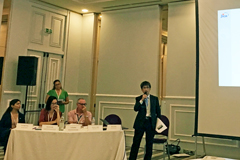JICA-RI Presents Lessons Learned From Aiding Ethnic Reconciliation After the Bosnian War at the GDI Annual Conference
2019.11.21
On Nov. 5 and 6, 2019, the Global Delivery Initiative (GDI) held its Annual Conference under the theme “Challenge Accepted: Delivering Services in Fragile, Conflicted-affected, and Transitional Environments” in the Tunisian capital city of Tunis. Katsutoshi Fushimi, assistant director of the JICA Research Institute (JICA-RI), participated in the event.
The GDI is the knowledge platform of a community of international development organizations, led by the World Bank. When implementing development projects, the GDI breaks down various delivery challenges into categories, and performs systematic analysis to find out what can be done to make things function well, while also sharing knowledge.
This Annual Conference was comprised of four overall sessions including keynote speeches and panel discussions, and a total of 17 breakout sessions. Roughly 80 development cooperation practitioners participated in the conference, representing international organizations, government agencies, bilateral development cooperation organizations, think tanks, NPOs and NGOs.
At the breakout session “Contending with Highly Complex, Fluid, and Opaque Political Dynamics,” Fushimi delivered a case study presentation about JICA’s project to support ethnic reconciliation in postwar Bosnia.
This was a peace-building project promoting both ethnic reconciliation and post-conflict reconstruction through revitalization of agriculture in Srebrenica, where approximately 8,000 Bosniaks were massacred during the Bosnian War (1992-1995). This autumn, JICA-RI published a project history book about this effort which began in 2005 while there was still a large rift between the Serbs and Bosniaks. “Reconciliation” was still a taboo word at the time, and it was difficult to get political commitment from the Bosnian side. Touching on the revitalization of agriculture as part of this project, Fushimi shared the efforts of JICA experts as a useful example of progress in ethnic reconciliation through agricultural development while promoting involvement by the local people. This conference served as a venue for sharing Japan’s knowledge on the subject and the challenges faced in implementation with the participants.

JICA-RI Assistant Director Fushimi delivered a case study presentation about JICA’s project to support ethnic reconciliation in postwar Bosnia
Fushimi later commented, “This Annual Conference of the GDI knowledge-sharing platform was a beneficial opportunity for participants to learn about the intellectual contributions of development officials throughout the world, while also learning from the experiences of other organizations.”

事業事前評価表(地球規模課題対応国際科学技術協力(SATREPS)).国際協力機構 地球環境部 . 防災第一チーム. 1.案件名.国 名: フィリピン共和国.

事業事前評価表(地球規模課題対応国際科学技術協力(SATREPS)).国際協力機構 地球環境部 . 防災第一チーム. 1.案件名.国 名: フィリピン共和国.

事業事前評価表(地球規模課題対応国際科学技術協力(SATREPS)).国際協力機構 地球環境部 . 防災第一チーム. 1.案件名.国 名: フィリピン共和国.

事業事前評価表(地球規模課題対応国際科学技術協力(SATREPS)).国際協力機構 地球環境部 . 防災第一チーム. 1.案件名.国 名: フィリピン共和国.

事業事前評価表(地球規模課題対応国際科学技術協力(SATREPS)).国際協力機構 地球環境部 . 防災第一チーム. 1.案件名.国 名: フィリピン共和国.
scroll